Disclosure: Some of the links in this article are affiliate links, which means that if you purchase through those links I will receive a small commission. For example, as Amazon Associate, I earn from qualifying purchases. If you decide to use these links, thank you!
Do you eat when you’re feeling stressed? Do you identify as a stress eater? Well you are definitely not alone. What you might not realize is that hunger and eating are perfectly normal responses to stress. In this post, you will learn why we eat when we are stressed. You will also discover how to cope with stress eating based on intuitive eating strategies.
Why You May Turn to Food When You’re Stressed
Eating when stressed does not mean that you have a lack of self-control or that something is “wrong” with you. Eating when stressed is completely normal. In fact, there are physical and psychological reasons for stress eating.
Physical Reasons for Stress Eating

There are a few ways that stress impacts our bodies and influences our eating.
Stress Impacts Food Choices. A clinical trial including 68 participants found that stress did not alter the overall intake of food. However, stressed emotional eaters ate sweeter, high-fat foods and more high-calorie foods than unstressed and non-emotional eaters (source).
Stress and Hunger Hormones. Grehlin has several functions, but it is usually referred to as the “hunger hormone” because it stimulates your appetite, increases food intake, and promotes insulin secretion. Ghrelin levels typically rise before a meal, when your stomach is empty. Then decrease shortly after when your stomach is full (source). However, exposure to stress can alter ghrelin levels, which in turn, can lead you to feel hungrier.
Stress and High Cortisol. Cortisol is a steroid hormone made in the adrenal glands. Cortisol is involved in the regulation of blood sugar, inflammation, metabolism, and memory. It is an important part of our bodies, but too much, caused by chronic stress, can increase hunger. High levels of cortisol trigger cravings for foods that will give you instant energy and gratification, like salty, sweet, and fried foods.
Psychological Reasons for Stress Eating

While stress can affect our body’s response to stress, it can also influence the way your mind responds to stress.
Stress Sucks up Your Mind’s Resources. When you’re stressed your brain switches into “survival mode”. This means that less of your cognitive resources are available to perform higher-level tasks like problem-solving and storing memories. This is why you might feel forgetful , foggy, or disorganized when you are stressed. What does this have to do with eating? Well, if you are not thinking clearly then you may ditch the plan you had to make dinner and end of eating everything in the pantry instead. Or, you may end up eating a whole bag of chips while you are making dinner.
Emotional Eating. We are all familiar with emotional eating. This is when food is used to cope with feelings. This is different than enjoying your food and honoring your hunger. Emotional eating is when you turn to food for comfort, distraction, numbing, or punishment (source).
For example, the other day my daughter was throwing a huge fit in the car because we were not going where she wanted to go (probably Dairy Queen). This stressed me out because of her loudness, uncontrollable behavior, and the fact that she was not listening to a word I was saying. As soon as we got home she ran to her room and I went to the kitchen to find the chocolate.
Did the chocolate comfort me in my time of stress? Sure did. Because chocolate is awesome. But, in the long run, eating chocolate did not really help me out because I still needed to (1) deal with the screaming child and (2) learn another way of dealing with stress.
I want to point out that emotional eating can be a useful way of coping with our feelings some of the time. However, food won’t really fix our feelings or solve our problems. In addition, emotional eating can cause guilt and shame afterward, which will only cause you to experience more stress.
Intuitive Eating Strategies to Cope with Stress Eating
Now that we know why we eat when we are stressed, what can we do about it? These are four questions based on Intuitive Eating principals that you can ask yourself if you feel like you may be eating due to stress.

- Am I hungry? When you are in your kitchen in search of food, stop and ask yourself if you are truly hungry. Remembering to stop and ask yourself this question is a huge first step to being mindful about listening to your body and eating. If yes, then go ahead and eat. If you are not truly hungry, move on to the next question.
- What am I feeling? You’re not really hungry, so what are you feeling that is making you search for food? In this post, we are focusing on stress eating, so it can be helpful to write down what you are stressed about. Sometimes it is a general feeling of stress, and that is something to be aware of too.
- What do I need? If you are eating due to feelings of stress, think about what you really need. Do you need to take a break and rest? Do you need to call a friend? Maybe you need a walk in the fresh air?
- Would you please…? Asking for help is one of the toughest things we can do…at least for me. But, if there is something you need help with, then don’t be afraid to speak up for your needs. For example, do you need time to yourself? Maybe help with the kids?
Stress Less Strategies
When you think about what you really need when you are stressed, it can be helpful to have a toolbox of strategies available. This is because when you are feeling stressed it’s hard to think about what the best thing for you would be. Having a handy list makes it easier, and more likely, that you will reach for a strategy other than food.

I love learning about what works for other people, so I asked four entrepreneurs to share their favorite strategies for coping with stress.
1. Mindfulness
“I recommend some basic mindfulness techniques to begin to focus on the simple and great things around us. Taking 5 minutes each day to listen to the sounds, smells and sights around us, can be a simple way to put the day into perspective. Whether in an office with others or working from home, taking a short time each day just to reassess, refocus and prioritize clearing the mind can be an incredibly productive way to get more done.” – Dr. Valeria Lo Iacono, Founder and CEO of Symonds Research
2. Take a Hike
“One of my favorite stress relievers is to take a hike. The physical activity combined with the sights and sounds of nature sooth my soul. Even better is a camping trip. It doesn’t have to be a bucket list destination or long vacation – one night is fun! It is so relaxing to escape the hustle and bustle of our busy lives and retreat and relax outside.” – Andrea Gentry, Adventure Seeker, Blogger, and Founder of Embracing the Wind
3. Exercise to Lower Stress
“My biggest tip is to make sure you fit in some exercise. Even just 20 minutes of raising your heart rate can work wonders to lower anxiety, decrease stress, and increase confidence during this very busy season of putting everyone else first.” – Brooke Stluka Selb, Health Coach, Personal Trainer, and Founder of Wrecking Routine
4. Self Care Journal
“I have been using a journal page that I created to cope with stress and promote better mental health for myself, it’s working really well for me. This helps me to congratulate myself on what went right and get focused on what I want from tomorrow.” – Tracey Skafidas, Founder of All Done Adulting (You can find more information and the printable journal page here).
Free Printables
A way to avoid chronic stress is to make sure you are taking care of yourself throughout the day. This could include things like meditation, taking your vitamins, spending time alone, connecting with others. Whatever works for you can go on your self-care checklist.
Enter your name and email address below to gain access to the Resource Library password. The Resource Library includes a PDF version of this self-care checklist! The PDF will include this completed example checklist in addition to a blank one for you to complete with your personal list.
I’ve also created a Stress Relief Strategies printable that you will find in the Resource Library. Print this out and keep it handy for when you need it the most.
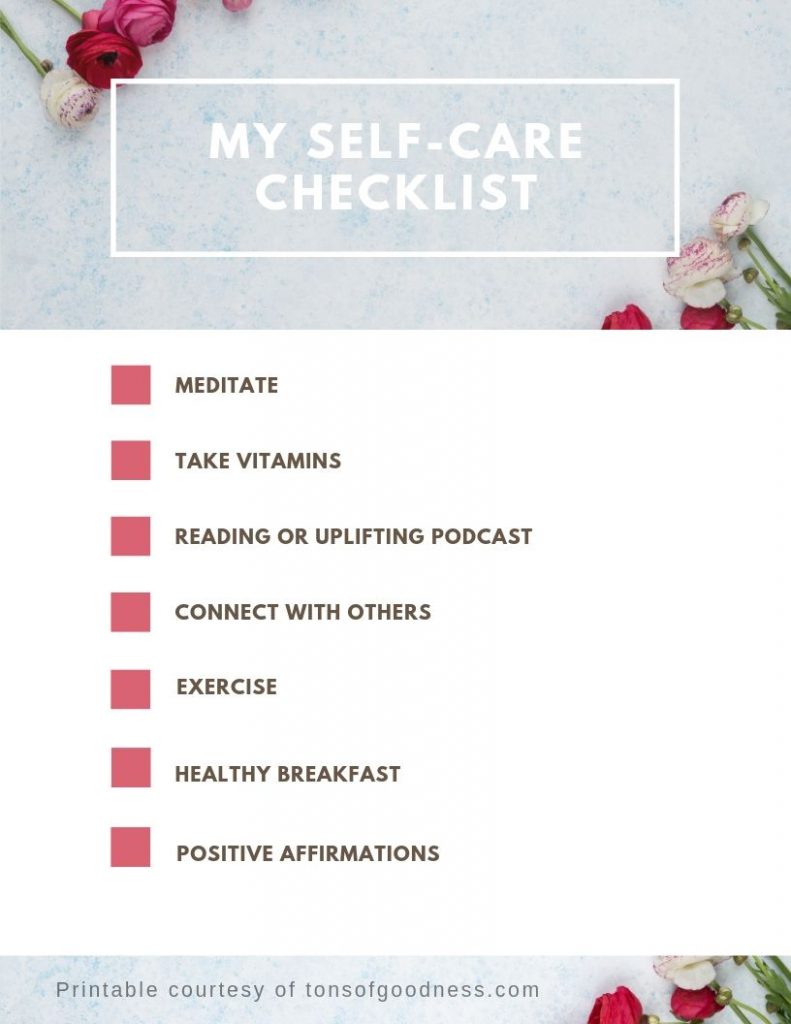
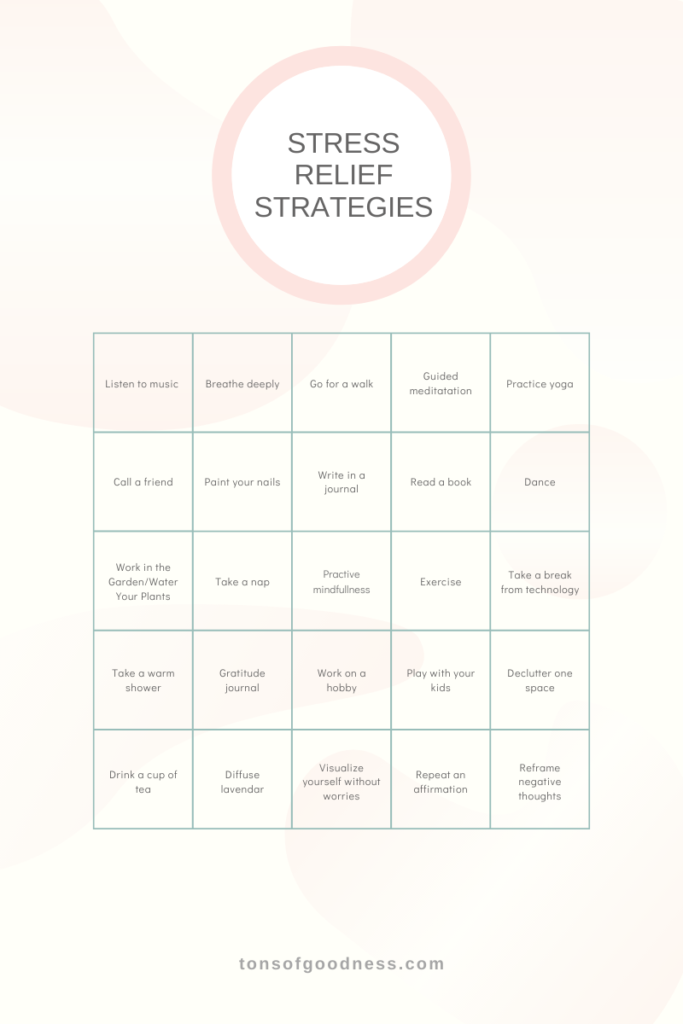
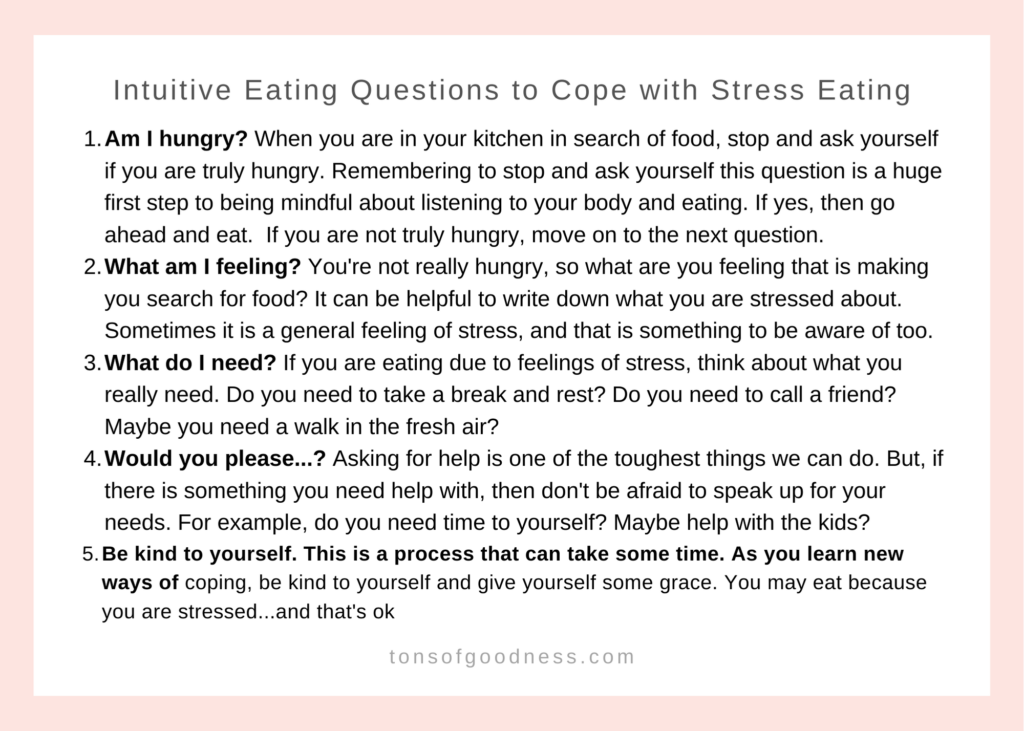
Be Kind to Yourself
This is a process that can take some time. As you learn new ways of coping, be kind to yourself and give yourself some grace. You may eat because you are stressed…and that’s ok. Over time, you will find that coping in ways other than eating will help you to have a better view of food and eating. Since I began learning about intuitive eating I have begun to feel less guilty about eating certain foods, enjoy food more, and am letting go of the dieting mentality.
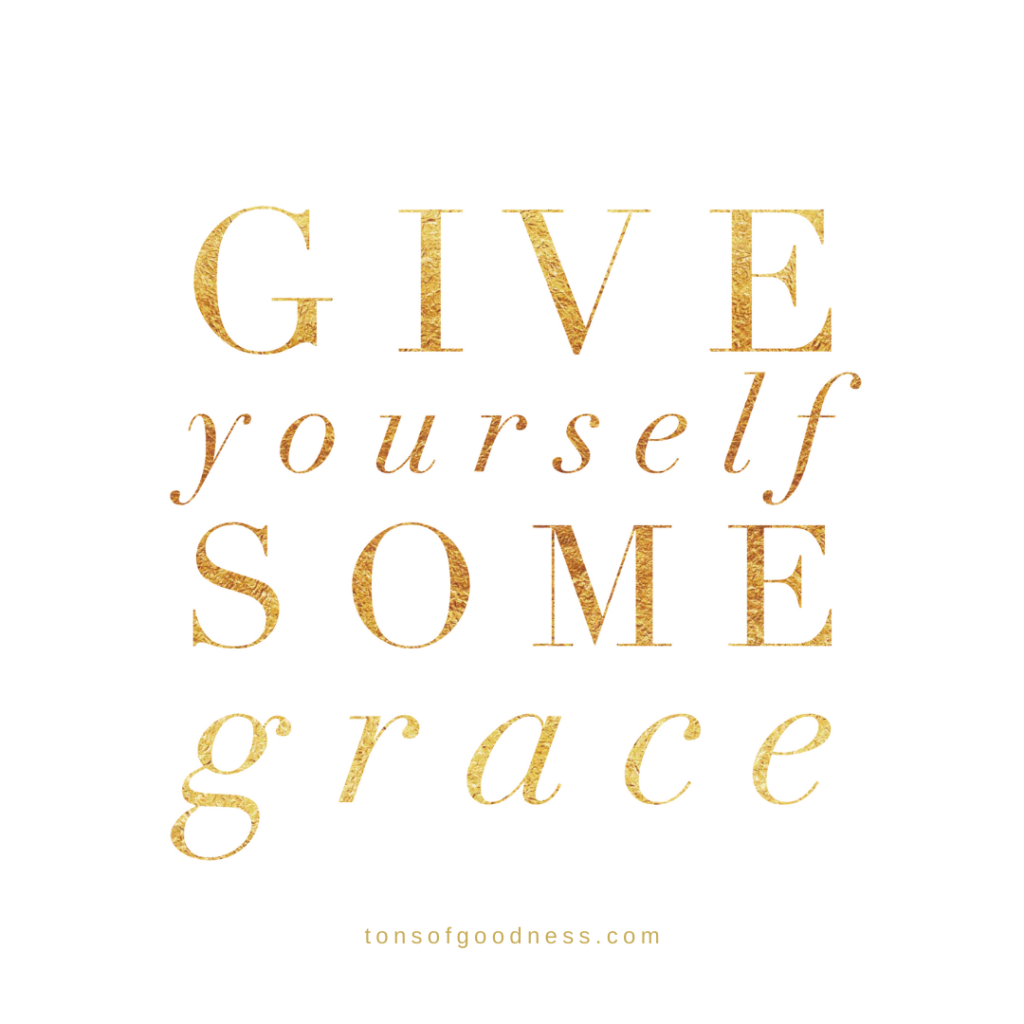
I hope this article is helpful to you. If you would like to join a group of women who will support your health goals, please join us by clicking here. We’d love to hear from you!

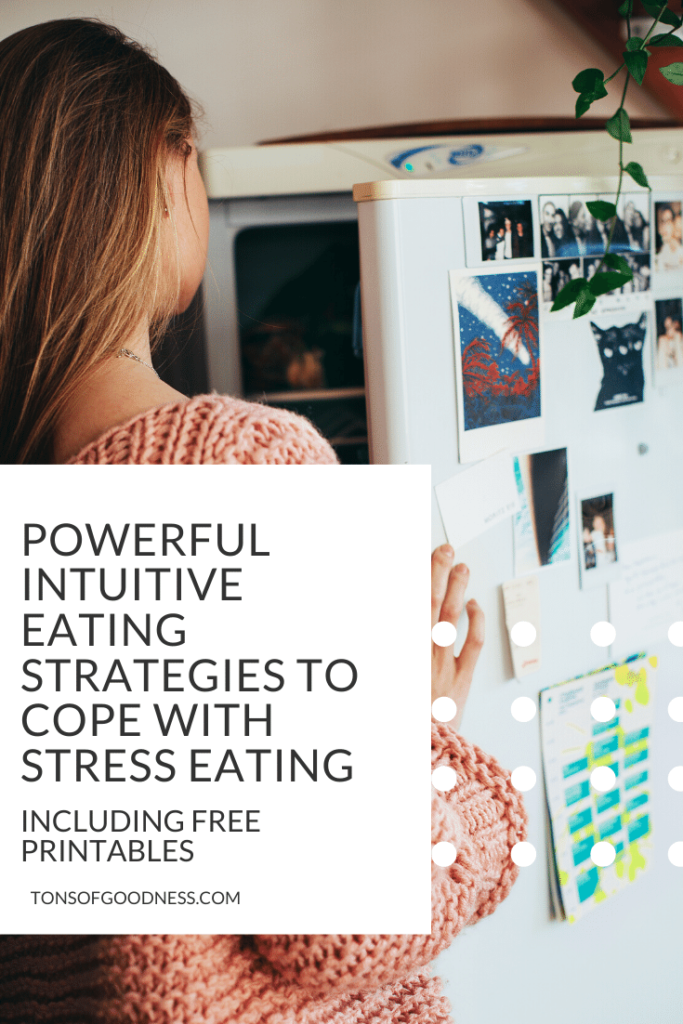
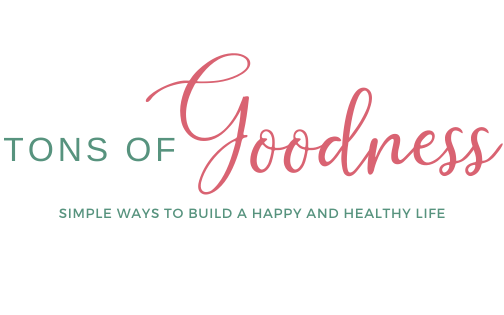
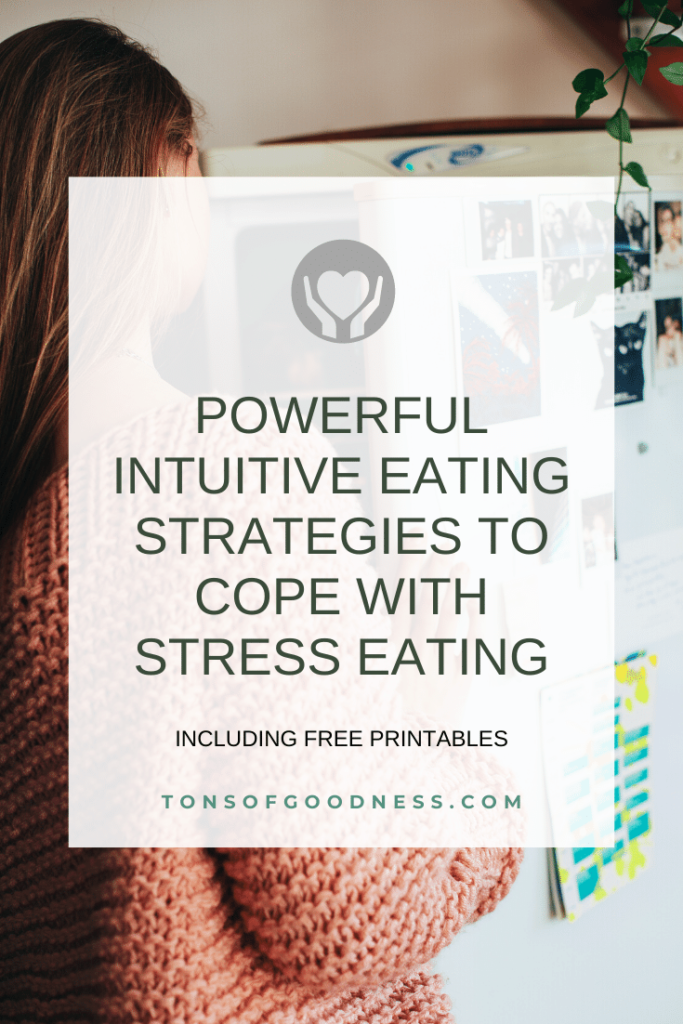

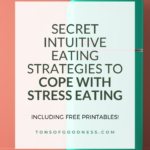
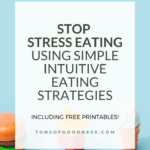
I felt like I needed to get out a notepad because of all the good information you shared. I knew Cortisol affected stress levels, but didn’t realize that it impacted stress eating. I’ve also never heard of Grehlin before. Definitely more informed and aware after reading this.
I have always been very good at eating my feelings. It took me years to realize that I did it both when something good happened and when something bad did. And I that was the first step. I still now and then fall into old patterns but I am working on it. Next time I am tempted to do it I will come back to this post! THanks!
Jenn, Hi, I’m glad this is helpful to you. I’ve printed the strategies list and the four questions printable and have them in my kitchen. They are reminders for me to think of other ways to deal with stress instead of reaching for food. It’s a process though for sure!
Mindfulness is so huge here. If you are not even aware of what is going on in your body and mind, you are going to have a hard time overcoming it. I also love the advice to take a hike. Just changing your environment can work wonders!
I’m doing meditation to reduce stress, it helps me a lot
That’s great! I feel like sometimes I don’t even realize how stressed I am until I sit down to meditate and focus on my body and my breath. I’m so glad it’s helpful to you!
Love the printables! They’re so pretty.
Thank you!